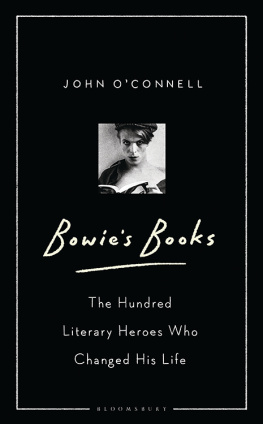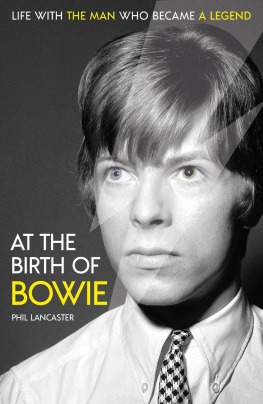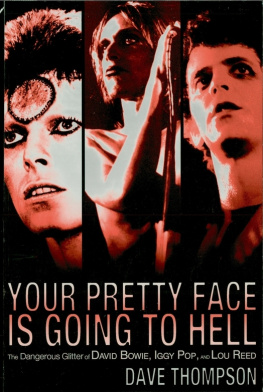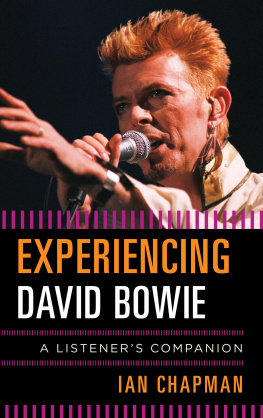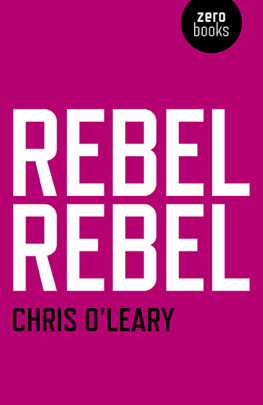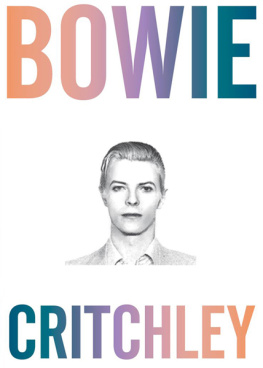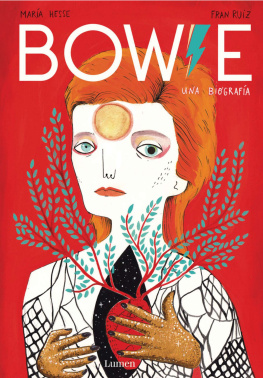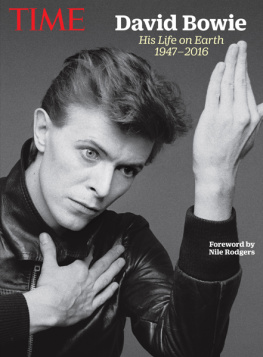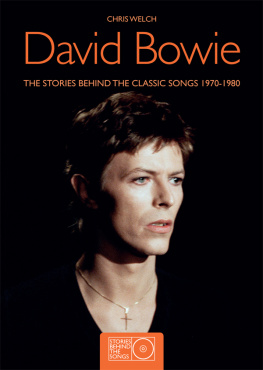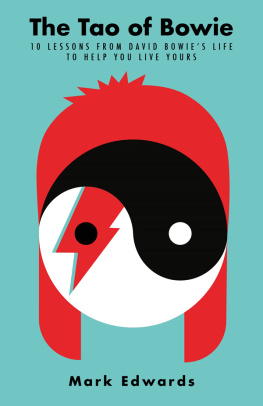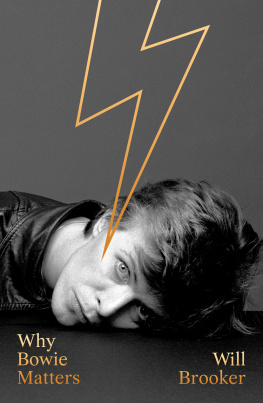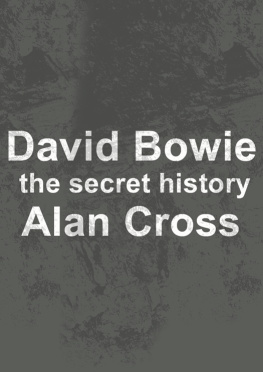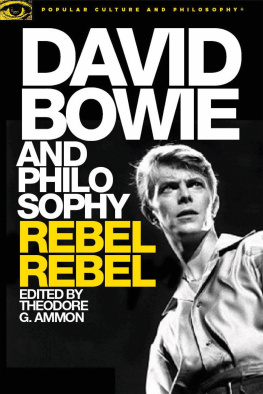

For Cathy, Scarlett and Molly

In July 1975, stick-thin and in the grip of a severe cocaine addiction, David Bowie arrived in New Mexico to shoot The Man Who Fell to Earth. He was twenty-eight and had been cast in the lead role of alien emissary Thomas Jerome Newton after the films director Nicolas Roeg saw him in a BBC documentary called Cracked Actor and was struck by his air of ethereal otherness.
On set Bowie surprised everyone by being diligent and engaged, happy to banter with the crew and work on his lines with his co-star Candy Clark. He had, rather ambitiously, promised not to use drugs for the duration of the shoot, so when he wasnt needed he would take himself off to his trailer and indulge in an altogether less harmful pastime: reading books.
Luckily, he had plenty to choose from. As a Sunday Times location report explained: Bowie hates aircraft so he mostly travels across the States by train, carrying his mobile bibliothque in special trunks which open out with all his books neatly displayed on shelves. In New Mexico the volumes dealt mainly with the occult, his current enthusiasm. This portable library stored 1,500 titles enough to make Clarks later observation to a journalist that Bowie really read a lot while making The Man Who Fell to Earth seem like a bit of an understatement.
Fast-forward to March 2013 The Victoria & Albert Museums exhibition David Bowie Is has opened in London to rave reviews and record-breaking ticket sales. A career retrospective featuring around 500 items from the singers personal archive including costumes, paintings, handwritten lyrics and video story-boards, it will traverse the world before bowing out at New Yorks Brooklyn Museum just over five years later. To coincide with the opening in Ontario, the shows first port of call after London, the V&A issued the list, on which this book is based, of the 100 books Bowie considered the most important and influential not, note, his favourite books as such out of the thousands he had read during his life.
These books had actually been a feature of the original London show where a selection was suspended from the roof. Still, the list quickly went viral amid a flurry of incredulous commentary, much of it reducible to: Wow, who knew David Bowie read so much? Which was odd because Bowie had advertised his bookishness for years, not just in interviews but, more obliquely, in his work and the range of masks he wore when he presented it to the public.
The mobile-library story shows how Bowies reading had calcified into a compulsion by the time he achieved his goal of being world-famous. He went about it the way he went about everything, with a kind of manic fervour. As a casual habit, however, it would have started in his bedroom at 4 Plaistow Grove, the small terraced house in the London suburb of Bromley where he spent his formative years of childhood and adolescence.
Books were cool and sexy back then; even cooler and sexier than they are now. (Imagine!) Allen Lane didnt invent the paperback when, in 1935, he launched Penguin Books, but he used his marketing and entrepreneurial genius to democratise reading, making the worlds best writing available for the price of a packet of cigarettes. Bowies post-war generation was the first to take this phenomenon for granted so that by 1966, when the Beatles Paperback Writer hit Number One, the term stood somehow for the takeover of Britains creative industries by people from provincial or working-class backgrounds.
Bowie underperformed at school and left in 1963 with just one qualification to his name an O Level in Art. Given the wide range of interests he subsequently cultivated, this suggests not laziness or an inability to retain information so much as impatience with formal education. Like many autodidacts, Bowie realised early on that he enjoyed teaching himself much more than he enjoyed being taught. And he took huge pleasure in passing on what he had learned to others: when he loved a book he would, say friends, proselytise passionately on its behalf.
This may be why, in 1998, he started writing book reviews for the US bookstore chain Barnes & Noble. They saw that I did a lot of book reviews on the site [his early website BowieNet], and they figured that it might not be a bad thing if they got me to do some for them as well, he told Time Out. I gave them five categories Id be interested in reviewing, from art to fiction to music. The first one Ive done is Glam! by Barney Hoskyns. Whats it like? Excellent.
Bowies creative method was particular and, until his imitators caught up with him, unusual for a pop musician. It involved opening himself wide to every possible influence. Not just other music but and this is what marked him out anything in any medium that might serve his vision. The resulting song, look, video or album cover inevitably pointed the way home to its sources, but via multiple, circuitous routes, those sources having been distilled in the alembic of Bowies charisma until sometimes they were barely recognisable. Bowie liked reading, so there was a natural role for books in this process.
Bowie also liked playing games and the V&A list is but one element of a game he enjoyed more than any other curating his own mythology.
Bowie also liked playing games and the V&A list is but one element of a game he enjoyed more than any other curating his own mythology. It has a notable precedent, as Bowie surely knew. In 1985 a publisher asked the Argentinian writer Jorge Luis Borges, laureate of libraries and labyrinths, to choose his 100 favourite books and write an introduction to each. Borges only made it to number 74 before he died, but his list, like Bowies, is wonderfully eclectic, suggestive and surprising, not to mention stuffed with writers we either know or can be pretty certain that Bowie rated (Oscar Wilde, Franz Kafka, Thomas De Quincey), though oddly there isnt a single title in common.
I like to think Bowie intended his list as a homage to Borges as a garden of forking paths (to borrow the title of one of Borges most famous stories) where, if you turn left at Edward Bulwer-Lyttons Rosicrucian romance Zanoni, you end up at Angela Carters Nights at the Circus; and where, having been inspired to seek clues to the identity of the real David Bowie by Flauberts Parrot, youre briskly funnelled along to Mr Wilsons Cabinet of Wonder, a book about the hair-splittingly fine line between artifice and authenticity.
None of which is to accuse the list of being insincere or unrevealing. On the contrary. Stare at it long enough and two main patterns emerge. The first is made up of the different cultural elements that cohered to form Bowies artistic sensibility. The second, a little hazier, has to do with chronology: arranged in the right order, the books plot a course through Bowies life from child to teenager and from drug-addled superstar to reflective, reclusive family man. I never became who I should have been until maybe twelve or fifteen years ago, he told the chat-show host Michael Parkinson in 2002. I spent an awful lot of my life actually looking for myself, understanding what I existed for and what made me happy in life and who exactly I was and what were the parts of myself that I was trying to hide from.
The role that reading played in this quest cant be underestimated. Because reading is, among much else, an escape into other people, other perspectives, other consciousnesses. It takes you out of yourself, only to put you back there infinitely enriched.
Next page
